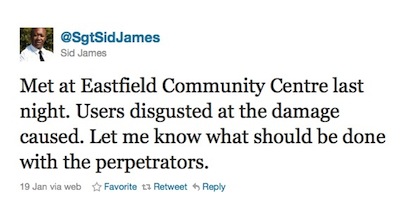Earlier this month a police officer (@SgtSidJames) who calls himself the “Sheriff of East Park” in Wolverhampton tweeted about the fact he’d arrested three people for damaging a community centre, damage which he reported disgusted the centre users. I was shocked by what came next; he urged those reading his tweets to:
“Let me know what should be done with the perpetrators.”
My first thought was the account must be a spoof; however I found a tweet from @wolvespolice showing @SgtSidJames is for real.
I tweeted a response:
@SgtSidJames Re:”Let me know what should be done with the perpetrators.”->Get them in-front of a court! What else were you contemplating?
This, and another tweet, into which I copied @wolvespolice were impressively picked up within a couple of hours by @CIPayneWMPolice who is Detective Chief Inspector Mark Payne from West Midlands Police (Wolverhampton Police is a Local Policing Unit within West Midlands Police). He responded telling me me:
@RTaylorUK we use a scheme called community resolutions which allows communities to influence the outcome. Eg graffiti artists clean it off
So this Sergeant – who calls himself the Sheriff – really was asking Twitter in all seriousness what ought happen to the three people he had arrested.
As yet the only suggestion he appears to have had via Twitter is mine – to get them to court.
Asking Twitter what should happen to people who’ve been arrested isn’t my view of what justice and due process should look like.
Unsurprisingly police force’s webpage on Community Resolution doesn’t mention anything about asking the “court of Twitter” what should happen to people once they are arrested.
My View
My view on community resolution is that it is a solution to a problem which only is only occurring because of the tick-box nature of current policing and a slow, remote, court system. Of course there’s no need to take every child who breaks a window or steals some sweets through the court if some informal arrangements can be made to ensure the child knows they’ve done wrong and the person who’s out of pocket is recompensed. Police officers ought be able to simply make a judgement that such cases need no further police action.
I am very uncomfortable with situations where the police decide further action is necessary; but take it upon themselves to take that action rather than get the case to court.
A number of the cases resolved by community resolution highlighted on the Wolverhampton and West Midlands police websites concern me. That someone who admitted to smashing wing mirrors off cars didn’t have his chances of getting in the navy put at risk by a criminal record is cited as a success of the scheme; yet without that criminal record the navy, or the court which deals with the criminal for his next offence might not be fully aware of the individual’s history. The question of more rapid compensation to victims which is touted as one of the prime benefits to the system is a problem with the courts; and in any case there is nothing stopping someone making such payments rapidly and asking the court to take that into account when sentencing them – however it people should not be able to buy there way out of going to court by making a payment to their victim. The fact the victim may be agreeable to the arrangement doesn’t inspire me with confidence when they are receiving a large sum of cash and so have a conflict of interest.
Community resolution is all about the victim and the offender, there is no one in the process considering the public interest, the interests of the wider community – I think the courts are best placed to do that.
The courts are being prevented from doing their job and ensuring violent criminals and those committing criminal damage are brought to justice.

One response to “Police Ask Twitter to Determine Fate of Arrested Individuals”
A response from @WolvesPolice completely missed the point – in typical blustering police fashion.